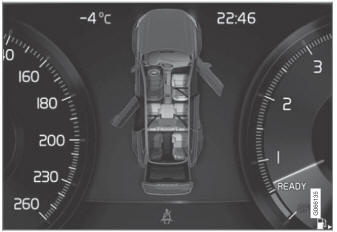Volvo XC90 2015-2026 Owners Manual / Starting and driving / Emission controls
Volvo XC90: Starting and driving / Emission controls
Three-way catalytic converter
- Keep your engine properly tuned. Certain engine malfunctions, particularly involving the electrical, fuel or distributor ignition systems, may cause unusually high threeway catalytic converter temperatures. Do not continue to operate your vehicle if you detect engine misfire, noticeable loss of power or other unusual operating conditions, such as engine overheating or backfiring. A properly tuned engine will help avoid malfunctions that could damage the three-way catalytic converter.
- Do not park your vehicle over combustible materials, such as grass or leaves, which can come into contact with the hot exhaust system and cause such materials to ignite under certain wind and weather conditions.
- Excessive starter cranking (in excess of one minute), or an intermittently firing or flooded engine can cause three-way catalytic converter or exhaust system overheating.
- Remember that tampering or unauthorized modifications to the engine, the Engine Control Module, or the vehicle may be illegal and can cause three-way catalytic converter or exhaust system overheating. This includes: altering fuel injection settings or components, altering emission system components or location or removing components, and/or repeated use of leaded fuel.
NOTE
Unleaded fuel is required for vehicles with three-way catalytic converters.
Heated oxygen sensors
The heated oxygen sensors monitor the oxygen content of the exhaust gases. Readings are fed into a control module that continuously monitors engine functions and controls fuel injection. The ratio of fuel to air into the engine is continuously adjusted for efficient combustion to help reduce harmful emissions.
 Octane rating
Octane rating
Volvo requires premium fuel (91 octane1 or higher) for all T5, T6
and T8 engines, and recommends AKI 93 for optimal performance and fuel economy.
See decal examples in illustrations 1 and 2...
 Overheating of engine and transmission
Overheating of engine and transmission
In certain driving conditions, such as driving in mountainous areas or hot
weather, there is a risk of the engine or transmission overheating, especially when
carrying heavy loads...
Other information:
Volvo XC90 2015-2026 Owners Manual: Adjusting set speed for driver support
It is possible to adjust set speeds for the cruise control, Adaptive Cruise Control* and Pilot Assist* functions. : Increases the set speed : Reduces the set speed Set speed Change a set speed by pressing the (1) or (2) buttons briefly or by pressing and holding them: Brief press: Each press changes the speed in +/- 5 km/h (+/- 5 mph) increments...
Volvo XC90 2015-2026 Owners Manual: Drive modes when using time interval to vehicle
The driver can choose different drive modes to determine how driver support should maintain a time interval to the vehicle ahead. Settings are made using the DRIVE MODE controls. Select one of the following: Eco - Driver support will focus on providing good fuel economy, which will increase the time interval to the vehicle ahead...
Copyright © 2026 www.voxc90.com

